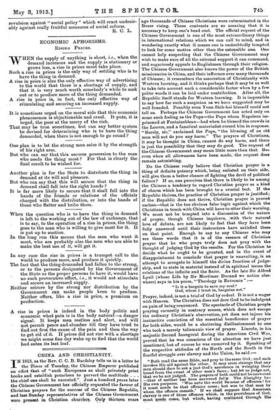ECONOMIC APHORISMS. RISING PRICES.
WHEN the supply of anything is short, i.e., when the demand increases and the supply is stationary or grows less, a rise in prices must take place.
Such a rise in prices is the only way of settling who is to have the thing in demand.
A rise in price is also the only effective way of advertising to the world that there is a shortage of supply, and that it is very much worth somebody's while to seek out or to produce more of the thing demanded. A rise in price is, in fact, the only effective way of stimulating and securing an increased supply.
It is sometimes urged on the moral side that this economic phenomenon is objectionable and cruel. It puts, it is urged, the poor at the mercy of the rich.
That may be true sometimes, but can any better system be devised for determining who is to have the thing demanded, when there is not enough to go round ?
One plan is to let the strong man seize it by the strength of his right arm.
But who can say that this secures possession to the man who needs the thing most ? For that is clearly the final result to be wished for.
Another plan is for the State to distribute the thing in demand at its will and pleasure.
But who can say that this will secure that the thing in demand shall fall into the right bands ? It is far more likely to secure that it shall fall into the hands of the friends or relations of the officials charged with the distribution, or into the hands of those who flatter and bribe them.
When the question who is to have the thing in demand is left to the working out of the law of exchange, that is to say, to the operation of a rise in prices, the thing goes to the man who is willing to give most for it. It is put up to auction. In the long run this means that the men who want it most, who are probably also the men who are able to make the best use of it, will get it.
In any case the rise in prices is a trumpet call to the - world to produce more, and produce it quickly.
The fact that the thing demanded had fallen to the strong, or to the persons designated by the Government of the State as the proper persons to have it, would have no such provocative effect, i.e., it would not stimulate and secure an increased supply.
Neither seizure by the strong nor distribution by the Government can make people keen to produce. Neither offers, like a rise in price, a premium on production.
A rise in prices is indeed in the body politic and economic what pain is in the body natural—a danger signal. It keeps men restless and alert, and will not permit peace and slumber till they have tried to find out first the cause of the pain and then the way to get rid of it. If prices did not rise with a shortage we might some fine day wake up to find that the world had eaten its last loaf.


















































 Previous page
Previous page